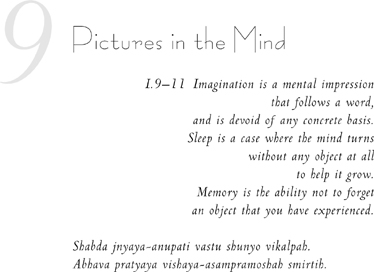

When we plan a dinner, we see in our minds the finished meal, although that meal doesn't yet correspond to any concrete thing. The words “What's for dinner?” inspire this picture in our imagination.
Most of our perceptions during the day are triggered by some outside object: seeing an apple is set off by the apple—in a sense the seeing depends, or hinges upon, the apple. When we sleep or dream there may not be any such outer object, but still the mind is turning, or operating, at a low level.
When we have a memory of something, again there is no outer object: just an approximate picture in the mind, sort of a shorthand note to remind us of something.
And so in the course of an entire day, our mind wends its way through different outside objects and inside images or thoughts. But unless we truly understand things—unless we understand what yoga really means—then every single perception and imagination we ever have is infected by the Great Mistake. Feelings, strong feelings, come up about the things we think we see—and the child beats her fist against the bad man on the screen.